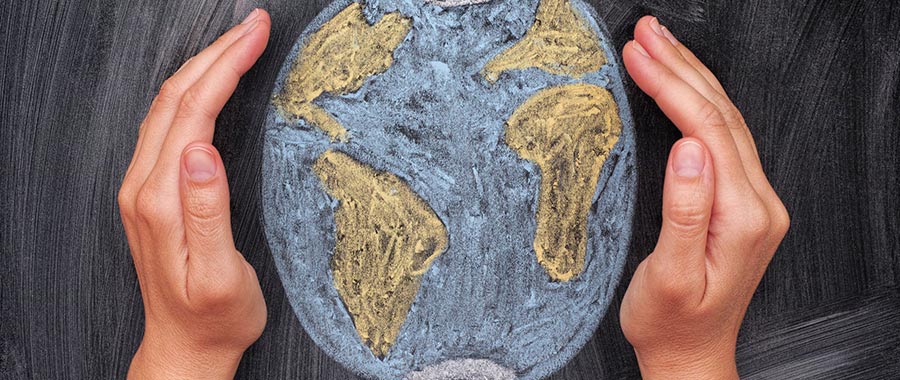The views expressed in our content reflect individual perspectives and do not represent the authoritative views of the Baha'i Faith.
Think about it: what image comes to mind when you hear the word servant? Do you think of someone who performs menial tasks or hard labor for little or no pay, like an indentured servant or a slave?
Maybe you picture a domestic servant, someone employed to help with household tasks like cleaning and cooking. Or do you imagine a public servant, a person who dedicates their life and energy to working for a government, an NGO or a charity? Do you picture a courageous paramedic or firefighter, someone who serves the public and saves lives, even at great risk to their own life?
Remarkably, the word servant covers a pretty broad range of definitions, some degrading, others exalted and honorable.
For Baha’is, one definition of the word “servant” elevates and ennobles the idea of service above all other stations we can aspire to—being a servant of humanity:
Ye who are servants of the human race, strive ye with all your heart to deliver mankind out of this darkness and these prejudices that belong to the human condition and the world of nature, so that humanity may find its way into the light of the world of God. – Abdu’l-Baha, Selections from the Writings of Abdu’l-Baha, p. 249.
That exalted station—selfless service to others, with the goal of carrying forward a peaceful, prejudice-free civilization—defines the Baha’i ideal of a spiritual life. But what does it mean? How can we, as single, powerless individuals, ever hope to serve all of humanity?
Thinking about the great servants of humanity, we might recall Mahatma Gandhi or Martin Luther King, Jr. or Mother Theresa or Florence Nightingale, whose lives of sacrificial service inspire many. For Baha’is, the most profound example of what it means to be a servant of humanity came from Baha’u’llah’s son Abdu’l-Baha—whose name itself means Servant. Abdu’l-Baha lived his entire life devoted to service for others. Baha’is see Abdu’l-Baha as the inspiring model for a well-lived life, as the true exemplar of what one person can achieve by selfless dedication to the welfare of all people.
Even though Abdu’l-Baha spent much of his life in prison and exile for his Baha’i beliefs, he constantly and consistently exemplified the Baha’i ideal of selfless service. The stories of Abdu’l-Baha’s service to humanity actually fill entire books. This one eyewitness summary, from a book by Dr. J.E. Esselmont, recounts Abdu’l-Baha’s service in Palestine during World War I:
During the war Abdu’l-Baha had a busy time in ministering to the material and spiritual wants of the people about Him. He personally organized extensive agricultural operations near Tiberias, thus securing a great supply of wheat, by means of which famine was averted, not only for the Baha’is but for hundreds of the poor of all religions in Haifa and Akka, whose wants He liberally supplied. He took care of all, and mitigated their sufferings as far as possible. To hundreds of poor people He would give a small sum of money daily. In addition to money He gave bread. If there was no bread He would give dates or something else. He made frequent visits to Akka to comfort and help the believers and poor people there. During the time of war He had daily meetings of the believers, and through His help the friends remained happy and tranquil throughout those troublous years. – Baha’u’llah and the New Era, p. 63.
Content with the spiritual life he lived, Abdu’l-Baha claimed no special station for himself beyond the station of servant. When the British government knighted him for his efforts averting famine during the war, he declined to be called Sir, and simply continued giving food to the hungry, tender care to the sick and warm clothes to the homeless. He humbly encouraged others to selflessly act as servants to God by being servants to God’s creation, humanity. He explained that the Baha’i Faith called us all to bring about peace, unity and love:
My admonition and exhortation to you is this: Be kind to all people, love humanity, consider all mankind as your relations and servants of the most high God. Strive day and night that animosity and contention may pass away from the hearts of men, that all religions shall become reconciled and the nations love each other so that no racial, religious or political prejudice may remain and the world of humanity behold God as the beginning and end of all existence. God has created all, and all return to God. Therefore, love humanity with all your heart and soul. If you meet a poor man, assist him; if you see the sick, heal him; reassure the affrighted one, render the cowardly noble and courageous, educate the ignorant, associate with the stranger. Emulate God. Consider how kindly, how lovingly He deals with all, and follow His example. You must treat people in accordance with the divine precepts — in other words, treat them as kindly as God treats them, for this is the greatest attainment possible for the world of humanity. – Abdu’l-Baha, The Promulgation of Universal Peace, p. 290.
All Baha’is try their best to follow Abdu’l-Baha’s loving, giving, radiant example of spirituality transformed through service into love.
You May Also Like
Comments

















by Kabir Helminski)